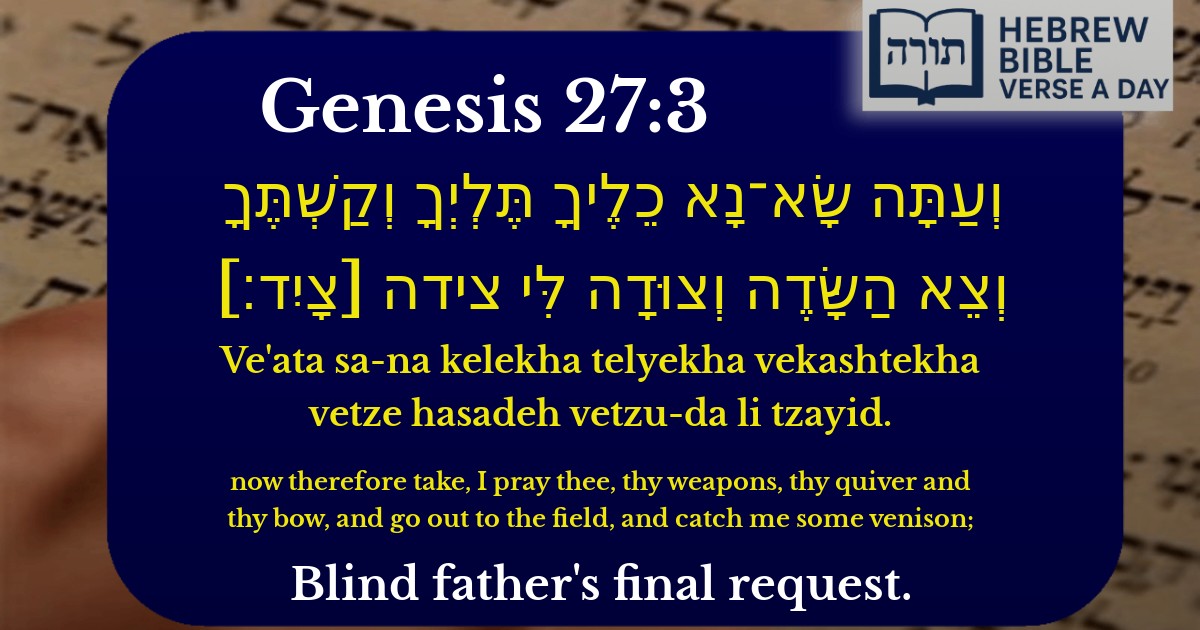Join Our Newsletter To Be Informed When New Videos Are Posted
Join the thousands of fellow Studends who rely on our videos to learn how to read the bible in Hebrew for free!
Hebrew Text
וְעַתָּה שָׂא־נָא כֵלֶיךָ תֶּלְיְךָ וְקַשְׁתֶּךָ וְצֵא הַשָּׂדֶה וְצוּדָה לִּי צידה [צָיִד׃]
English Translation
now therefore take, I pray thee, thy weapons, thy quiver and thy bow, and go out to the field, and catch me some venison;
Transliteration
Ve'ata sa-na kelekha telyekha vekashtekha vetze hasadeh vetzu-da li tzayid.
Hebrew Leining Text
וְעַתָּה֙ שָׂא־נָ֣א כֵלֶ֔יךָ תֶּלְיְךָ֖ וְקַשְׁתֶּ֑ךָ וְצֵא֙ הַשָּׂדֶ֔ה וְצ֥וּדָה לִּ֖י <span class="mam-kq"><span class="mam-kq-k">(צידה)</span> <span class="mam-kq-q">[צָֽיִד]</span></span>׃
וְעַתָּה֙ שָׂא־נָ֣א כֵלֶ֔יךָ תֶּלְיְךָ֖ וְקַשְׁתֶּ֑ךָ וְצֵא֙ הַשָּׂדֶ֔ה וְצ֥וּדָה לִּ֖י (צידה) [צָֽיִד]׃
🎵 Listen to leining
Parasha Commentary
📚 Talmud Citations
This verse is not quoted in the Talmud.


Context of the Verse
This verse (Genesis 27:3) is part of the narrative where Yitzchak (Isaac) instructs his son Esav (Esau) to hunt game and prepare a meal so that he may bless him before his death. The verse reflects Yitzchak's preference for Esav's hunting skills and sets the stage for the subsequent events where Yaakov (Jacob) receives the blessing instead.
Rashi's Commentary
Rashi explains that Yitzchak's request for Esav to bring him game (צידה) was motivated by his love for Esav's hunting prowess, as stated earlier in Genesis 25:28 ("וַיֶּאֱהַב יִצְחָק אֶת־עֵשָׂו כִּי־צַיִד בְּפִיו"). Rashi also notes that the phrase "שָׂא־נָא כֵלֶיךָ" ("take, I pray thee, thy weapons") implies Yitzchak's awareness of the dangers of hunting, as he instructs Esav to arm himself properly.
Rambam's Perspective on Hunting
While Rambam (Maimonides) does not comment directly on this verse, his teachings in Moreh Nevuchim (Guide for the Perplexed 3:39) discuss hunting as a characteristic of Esav's nature—associated with violence and indulgence, contrasting with Yaakov's refined, studious demeanor. This aligns with the Torah's portrayal of Esav as "אִישׁ יֹדֵעַ צַיִד" (a man skilled in hunting).
Midrashic Insights
The Midrash (Bereshit Rabbah 65:10) elaborates that Esav's hunting was not merely for sustenance but involved deception—he would trap animals using his father's garments to appear righteous, thus misleading Yitzchak. This foreshadows the later deception in the blessing narrative.
Symbolism of the Bow and Quiver
Yitzchak's Intentions
Some commentators, like the Kli Yakar, suggest that Yitzchak sought to elevate Esav's physicality by channeling his hunting skills toward a holy purpose—preparing food for a blessing. However, Esav's failure to internalize this lesson led to the transfer of the blessing to Yaakov, who embodied the spiritual ideals of the covenant.